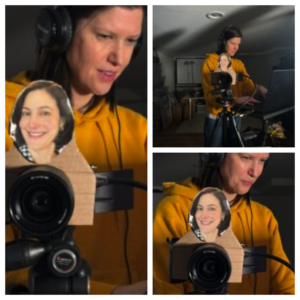Matthew Dicks's Blog, page 22
April 18, 2025
The Moth again
I was honored to have another story on The Moth Radio Hour and podcast last week — aired all over the country on NPR.
It’s the story of how my friend and I bonded over an unexpected song from an unexpected source.
You can listen here, and you can listen to all of my stories that The Moth has aired on NPR over the years here.
I’m so grateful to The Moth for affording me and so many other storytellers a platform to be celebrated.
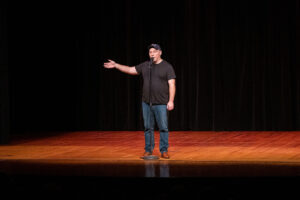
April 17, 2025
Delighting customers is not difficult. 110 Grill would seem to disagree.
Elysha, Clara, and I had lunch at 110 Grill in Canton, Connecticut, this week.
I experienced a moment of frustration with this restaurant last year. My family and in-laws wanted to eat outside on their patio—a party of six—and were told that the tables that accommodated six or more guests were occupied. There were many four-person tables, so we asked if two could be pushed together to accommodate our party, and the manager refused.
It was mid-afternoon on a Tuesday. The restaurant was nearly empty. This request could have been easily met. Having managed restaurants for a decade, I would have granted this kind of request with ease.
Why would you not?
The manager of 110 Grill refused. When I asked why, she told me it wasn’t their policy to move tables.
“Policy?” I asked. “There’s an actual rule about moving tables in a restaurant?”
“Yes,” I was told with a straight face.
A supposed policy about moving a table six feet across an open space prevented 110 Grill from making a customer happy, increasing sales, and giving a server the chance to earn a decent tip on a party of six.
So we went down the street to a place where we could eat outdoors and had a lovely time.
Then, I wrote a letter to the 110 Grill’s management expressing my disappointment and suggesting that they rethink this policy.
I never received a response.
Not even a simple note reading, “Thank you for your feedback. We appreciate your patronage and hope to see you soon.”
Still, we returned for another meal this week. After waiting an exceedingly long time for a server to arrive at our table, I ordered a chicken sandwich and a Diet Coke.
Ten minutes later, the server returned to inform me that the last piece of chicken had just been served, so I would need to make another choice.
Ten minutes is a long time between placing an order and discovering you can’t fulfill the order, but I smiled and asked for a moment to consider my options.
The server disappeared for another five minutes.
When she returned, Elysha asked if we might get some bread since we’d been seated for quite a while and it would now be a while before our food arrived.
We were given some toast. Then I had to remind my server that I still hadn’t received my Diet Coke.
Elysha’s salmon was overcooked, probably because the chef started cooking it before realizing there was no chicken. Her rice was dry and crunchy, probably for the same reason.
Not a great experience. But here is the thing:
It’s not hard to make a great impression. A mistake like running out of chicken should be considered an opportunity to delight. After returning to the table to ask me to make another choice, we should’ve been offered a free appetizer or dessert.
Maybe a glass of wine or a mocktail.
Maybe my meal could’ve even been taken off the bill.
Any of these options would’ve cost the restaurant almost nothing and turned annoyance and disappointment into a fond memory of generosity and thoughtfulness.
Mistakes happen. They should be avoided at all costs, but failing to satisfy a customer is an opportunity to delight them. Overwhelm them with an apology and an act of generosity.
When I was managing McDonald’s, I did this all the time. If we forgot an item in a drive-thru order, requiring the customer to come inside to correct the mistake, they always left the restaurant with complimentary apple pies, coupons for free sandwiches, or a pile of Big Macs.
Anything to turn a negative experience into an exceedingly positive one. A surprisingly generous one.
It’s not hard to delight a customer, and that delight is enormously valuable.
I could be singing the praises of the 110 Grill, telling friends and family that it’s the kind of place that values its customers and takes care of them as guests.
Instead, I write letters that go unanswered and a blog post about a disappointing visit and an opportunity lost.
It’s not hard to delight customers, though the 110 Grill in Canton, CT, seems to disagree.
I’d send them a copy of Will Guidara’s excellent book, “Unreasonable Hospitality,” but I don’t think they’d read it.
[image error]
April 16, 2025
A silver lining but mostly disappointment
Nine years ago, I attended a Guns N’ Roses concert with my friend, Heather, at Gillette Stadium.
At the time, I had pneumonia. Elysha and I had just returned from celebrating our tenth anniversary in Maine, where I also knew I had pneumonia, but I didn’t tell Elysha because I didn’t want to ruin our getaway weekend. Instead, I moved slowly, relaxed, rested a lot, and didn’t try to fit everything possible into one day. I watched the sun go down, slept late into the morning, and chilled.
Later, Elysha would tell friends, “I think I liked pneumonia Matt more than regular Matt.”
When we arrived home, I told Elysha I had pneumonia. She thought I was crazy, but two hours later, a chest X-ray confirmed it. It was my third bout of pneumonia in eight years, so my doctor gave me the pneumonia vaccine, which, in her words, she gives to “75-year-old widows and you.”
I didn’t even know a pneumonia vaccine existed.
Then I went to the Guns N’ Roses concert the next day.
This meant moving at the speed of a wounded snail and sitting for most of the concert. Happily, we had seats in the front row of a section, so I was able to enjoy the concert with my butt in the seat.
On Friday night, Charlie and I attended the Celtics game in Boston. He wasn’t feeling well but was determined to go.
Who was I to stop him?
By the end of the game, he was feeling pretty awful:
Coughing and chills. Dragging his feet. “I’m a wreck,” he said as we made our way through the snow to the parking garage.
Yes. Snow in April. We awoke the next morning with a lawn covered with the white stuff.
Elysha took him to the doctor the next day to ensure he didn’t have COVID or the flu. We were scheduled to leave for Niagara Falls and Canada the next day.
A lovely, week-long vacation to our neighbors in the north, combined with a business dinner with about 25 Canadian entrepreneurs.
But Charlie has the flu. The doctor said she didn’t even need to set the timer on his test. It immediately registered positive, which meant our plans had been derailed. We planned this same trip for April 2020, but you know what happened then.
Once again, we have been denied. Instead of visiting Niagara Falls and Toronto, we are home during the April vacation, hoping he’s healthy enough for a day or two in New York Coty at the end of the week.
But my business dinner is still happening, of course, so now, instead of a lovely drive north with my family, I’m flying into Toronto for my business meeting, which is fine but also annoying and much less fun.
I’m writing this post at Dulles International Airport in Washington DC, suffering through the second of two delays that will land me in Canada well after midnight.
Flying is so much fun.
But the silver living:
Charlie cared enough about the Celtica game to tough it out while suffering from the flu.
Just like I toughed it out with pneumonia to visit Maine and see Guns N’ Roses.
Life father, like son.

April 15, 2025
AI versus A.1.
Education Secretary Linda McMahon was speaking last week at the 2025 ASU+GSV Summit, an annual gathering of education and learning leaders when she mistakenly referred to AI (artificial intelligence) as A.1. (the steak sauce brand) more than a few times.
The Secretary of Education—in the process of eliminating the Department of Education—might be the only person in America who doesn’t know the difference between artificial intelligence and a hickory-smoked marinade for your next rib eye.
Combine this with a Secretary of Health and Human Services who openly questions the efficacy of vaccination as the largest measle outbreak in decades continues to spread throughout the southwest, killing children, and we find ourselves in a true kakistocracy:
A government run by the worst, least qualified, or most unscrupulous citizens.
Of course, stupidity starts at the top with Donald Trump, who:
Claimed that windmills cause cancerSuggested that bleach might be injected into the body to cure COVID-19Thought that Belgium is a cityCouldn’t explain the nuclear triadClaimed that U.S. forces “took over the airports” during the Revolutionary WarThat is a tiny sampling of his ignorance over the years.
On a positive note, the steak sauce company, A.1., took advantage of McMahon’s shocking ignorance to have a little fun, posting on social media:
“Every school should have access to A.1.”
Well played, A.1. Never let a moment of publicity go by untapped.

April 14, 2025
A little more brilliance from Robin Williams
The producers of “Mork and Mindy” — a television show starring Robin Williams and Pam Dauber from 1978-1981 — needed censors who spoke four languages to catch all the swear words Robin Williams tried to sneak in during filming.
Robin Williama played an extraterrestrial from the planet Ork, so he constantly broke into his alien language, which he apparently attempted to lace with swear words for his and our amusement. .
This makes me so happy.
Subversion and tomfoolery.
Antiauthoitarianism.
Pranking and hilarity.
Ingenuity and cleverness.
All the things I adore.
Robin Williams was a brilliant human being.
The world is a little less bright without him.
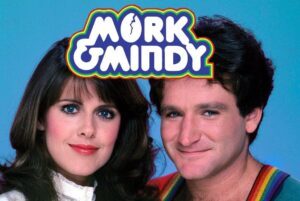
April 13, 2025
They call me Matt
At the end of “Light My Candle” in the musical “Rent,” Mimi and Roger introduce themselves to each other.
Roger sings, “I’m Roger.”
Mimi responds, “They call me Mimi.”
I’ve always loved the way she introduces herself:
Not “My name is Mimi,” or I’m Mimi,” but “They call me Mimi.”
I asked Elysha a long time ago if I could begin introducing myself in this way.
“They call me Matt” actually applies — at least a little — given that my real name is Matthew, but people call me “Matt” or, in the case of some of my oldest friends, “Matty.”
Elysha’s response:
No.
It was an emphatic no indicating that I should not proceed further along this line of questioning, so I didn’t.
Not that day, at least.
I’ve brought it up again over the years, but her emphatic no has remained constant.
Today, Clara has a friend named Mimi, so I was hoping that maybe she could at least use the iconic line in her life. If I am to be denied, perhaps I can help another soar.
Mimi has never seen “Rent” or listened to the soundtrack, which is even worse than not using the iconic introduction.

April 12, 2025
It was a lot of things, but it was sacrifice, too
I’m often asked how I forged my storytelling and consulting career.
It turns out a lot of people would like to do the same.
My responses vary, but they often center on the idea that none of this part of my life was planned. In the summer of 2011, I went to New York City to tell a story at The Moth after listening to a podcast and learning that it existed.
I stumbled upon something I loved and did well.
As Elysha rightly pointed out, I was also a wedding DJ for 28 years, so I had spent countless hours speaking to audiences of strangers on a microphone. I’ve also been an elementary school teacher for nearly as long, so I spend my days telling stories to the worst audience of all:
Ten-year-old children.
I’ve also written every day of my life since I was 17, published six novels and three nonfiction books, read obsessively, and studied creative writing and public speaking in college. I was also a two-time state debate champion.
I wrote to Stephen Spielberg when I was ten years old, complaining about a scene in “ET: The Extra-Terrestrial” that was so stupid that it nearly ruined the film. I offered to review all of his movies before he sent them to movie theaters to avoid mistakes like this in the future.
In other words, I’ve been steeped in story and public speaking for a very long time.
Not exactly a repeatable path.
Ultimately, I tell people that you need to become good at telling stories and become known for excellence before anyone will want your expert opinion, so get to work.
This is how all success stories happen:
When you get good at something, people will notice. But getting good at anything is hard. It requires effort, focus, and a long-term commitment to the craft, whether it’s storytelling, gardening, baking, or crocheting.
I was recently reminded of one other important element:
Sacrifice.
I live more than two hours from New York City and Boston, meaning that every time I go to The Moth to maybe tell a five-minute story if my name is chosen at random, I get into the car after work, drive into the city, and return home well after midnight.
In those early days, I often made this trip alone.
And I did all this for free.
Actually, it wasn’t even free. I purchase a ticket to every show I attend.
Since 2011, I’ve performed in about 160 Moth events, and I’ve attended at least another 75 more when my name wasn’t chosen. That’s about 235 afternoons, evenings, and late nights spent driving to New York City or Boston to sit in comedy clubs, bookstores, theaters, and museums, hoping to tell a story.
That doesn’t include the hundreds of times I’ve performed for other shows in these cities and beyond.
Many people have thought me a little crazy over the years to do what I do, and perhaps it was. Spending a total of five or six hours in a car to maybe tell a story for free sounds silly, but today, I perform all over the world. I’m paid to tell stories, deliver keynotes, consult with companies and nonprofits, coach executives, teach at universities, and perform solo shows.
Elysha and I have also launched Speak Up, and I own Storyworthy, a company that produces online storytelling courses.
I made a lot of sacrifices.
I meet a lot of people who are unwilling to make the sacrifice. They want to chase the dream, but they also want to be in bed at a reasonable hour. They want ease, convenience, and certainty.
Sadly, few things worth chasing are easy, convenient, or certain.
My sacrifices happily, thankfully, paid off. But I wasn’t planning any of it when I began this adventure. I was pursuing something I loved that I hoped might lead me somewhere someday.
I wasn’t sure where, but I was willing to work like hell to find out.
There are no magic pills, shortcuts, or paths to doing anything well that don’t require time, effort, and sacrifice.
Annoying, I know, but true.
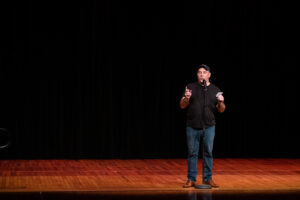
April 11, 2025
Reverse engineering boy
Charlie was required to reverse engineer an electronic item as part of his work at his Aerospace Academy.
After completing his project, his desire to continue as a reserve engineer did not cease, so he’s constantly looking for unused electronics around the house:
Remote controls, old toys, video game controllers.
Three things about this:
I’m keeping a close eye on my things.I keep finding circuit boards all over the house.Why didn’t anyone let me do this as a kid?Charlie is so lucky.

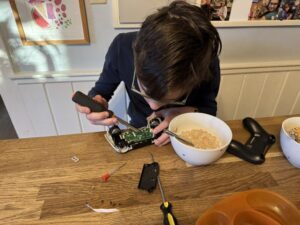

April 10, 2025
Wax beans? Anybody?
I told my students how much I despised wax beans when I was growing up.
They had no idea what I was talking about.
So I pulled up the image of a can of wax beans to show them.
Still nothing.
Not a single one of them had ever been subjected to the horrors of wax beans.
So I asked a handful of colleagues. None of them had ever eaten wax beans. Most had never heard of the dam things.
So I asked Elysha.
She, too, had never eaten wax beans. Never out of a can, at least. Maybe as a part of some dish, but never on their own.
What the hell is going on? Was my mother the only person on the planet subjecting her children to this horrible vegetable?
Wax beans seem to still be on the market today, but is anyone buying them, and if so, why?

April 9, 2025
I talk to Elysha
I spend a lot of time staring into a camera lens, recording courses, YouTube videos, promos, and more.
My ingenious production manager, Kaia, realized that I am far more animated and engaging when speaking to a person than an inanimate object, so she placed a photo on the lens of the screen so I have someone to whom I can speak while recording content.
Naturally, she chose my favorite person in the world.
It’s good to have bright, clever, insightful people working for you.
